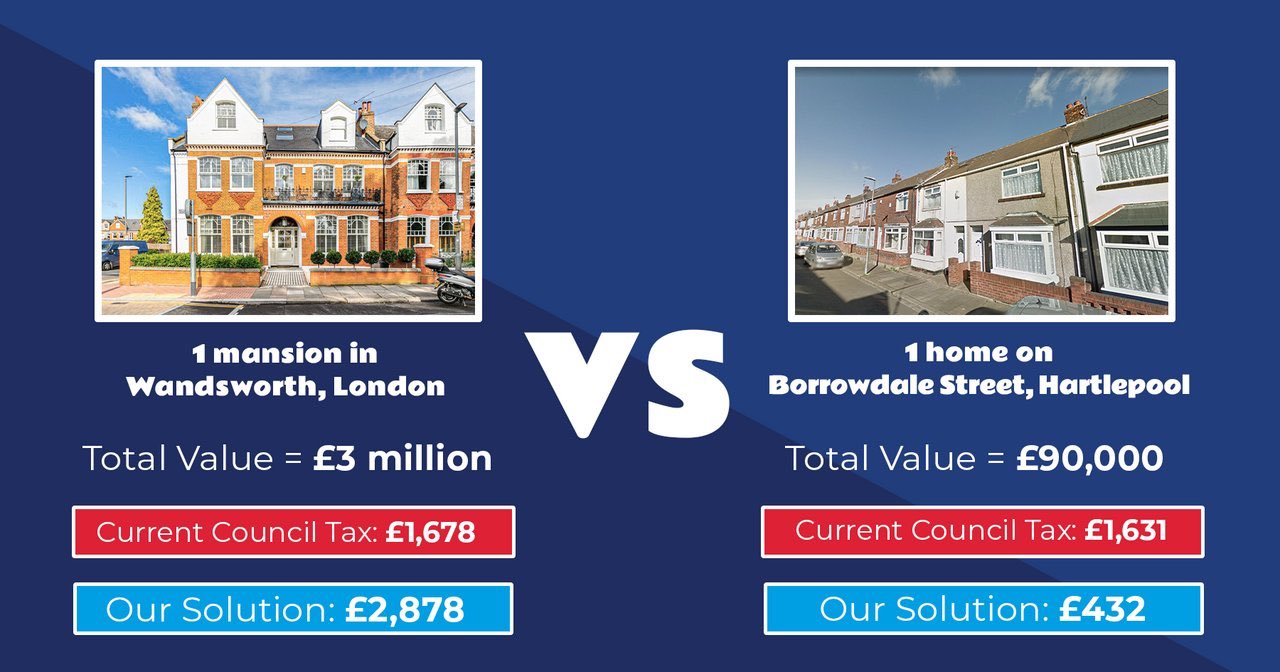New polling by the Fairer Share campaign hints at the huge potential gains in store for a party that is brave enough to reform our broken property taxes. With local elections around the corner, four out of ten people would consider switching their vote to a party pledging to replace council tax with a fairer property tax system with lower annual bills for most people and local services maintained at the same level. In the so called ‘red wall’ areas of the country, the figures are higher with almost half of all people questioned saying they would consider switching their vote.
It should come as no surprise to see the extent to which many people are fed up with council tax. It is outdated and highly regressive, both within local areas and between them. Council tax hits the poorest residents of our society hardest while mansions or luxury apartments in Westminster or Kensington barely notice council tax, deeming it less than a service charge.
The worst hit areas are the regions of the United Kingdom once known as Labour’s heartlands, with the North East getting hammered the hardest. Hartlepool, for example, is the worst hit local authority. Residents there pay 1.31% of the value of their homes in council tax, whereas in Westminster, the average resident pays just 0.06% of their property value in council tax. That means the average resident in Hartlepool has a council tax burden 22 times that of Westminster.
Yet to talk about the regional disparities is to underplay the full extent of the problem. Council tax is derived by bands based on 1991 house valuations. The bottom bands pay a larger percentage of property value than the top bands, and houses at the bottom of each band pays significantly more than a property at the top of it.
At Fairer Share, we propose replacing council tax and stamp duty, which has a whole host of problems that hinder economic growth, with a flat property tax of 0.48% of the value of the property.

Flat taxes usually aren’t considered great progressive victories, but that is merely a reflection of the backwardness of the current system (something that shouldn’t be surprising given that portable MP3 players are five years newer than the current council tax regime).
Replacing council tax and stamp duty would be beneficial 76% of households across the UK. There are particular benefits for the poor, nearly 90% of the poorest in society and would add nearly £300 to their average net income per year. Although, on the face of it a neutral policy, it would also have social justice implications, with our analysis showing that large majorities of households in all the UK’s major ethnic minority communities benefiting from a move from council tax to a proportional property tax.
Remarkably, this policy can be achieved without taking a penny out of the treasury’s coffers. The flat rate of 0.48% would return exactly the same revenue as that lost by council tax and by stamp duty, and helping to preserve the vital local services on which we all depend. Raising money for police or social care with regressive precepts could be a thing of the past as local authorities could flex their local rate and raise revenues more fairly from their residents.
Support for the policy is growing in Westminster. Labour’s Grahame Morris is a key supporter, having pushed Boris Johnson on the policy at Prime Minister’s Questions recently. But the policy cuts across party lines, with a number of northern Conservative MPs also supportive.
Across the UK, more than 120,000 households have signed our petition calling for a proportional property tax. A progressive Labour party should also be wholeheartedly backing the introduction of a fairer system of property tax that will deliver in real terms for the majority of voters up and down the country.


3 replies on “Council Tax is regressive and broken, fixing it would be a progressive victory”
1/ Flat rate per council yes so that someone in a house worth £1 million pays 10x what someone on a house worth £1,000 pays.
2/ Put the councils into bands so that more is raised in high average property value councils than low. Divert this money towards the latter councils. Avoid the property tax in the cheaper properties in the high average value councils being excessive – no good a Costa barista in London in a £300,000 house paying 3x what a Costa barista in a £100,000 house in Hartlepool pays.
Thanks for addressing this
You all seem to miss the point, for very poor households council tax relief is available, having paid council tax in a very poor area of South Wales it was obvious that the great number claiming relief loaded the remaining with a very high tax – and in my case more than 15% of my disposable income, unjust for sure. Radical change is needed, a local purchase tax where the more you spend the more you pay might work in metropolitan areas, but not rural areas.
Central government payments might work, depending upon who is in office (known history of reducing this source of income for some councils makes trusting our government to be even handed makes this difficult without legislation forcing them to behave).
There must be many solutions to force the rich to pay a fairer share.